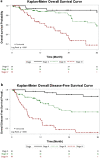Applicability of minimally invasive surgery for clinically T4 colorectal cancer
- PMID: 33230168
- PMCID: PMC7683557
- DOI: 10.1038/s41598-020-77317-2
Applicability of minimally invasive surgery for clinically T4 colorectal cancer
Abstract
The role of minimally invasive surgery (MIS) to treat clinically T4 (cT4) colorectal cancer (CRC) remains uncertain and deserves further investigation. A retrospective cohort study was conducted between September 2006 and March 2019 recruiting patients diagnosed as cT4 CRC and undergoing MIS at a university hospital and its branch. Patients' demography, clinicopathology, surgical and oncological outcomes, and radicality were analyzed. A total of 128 patients were recruited with an average follow-up period of 33.8 months. The median time to soft diet was 6 days, and the median postoperative hospitalization periods was 11 days. The conversion and complication (Clavien-Dindo classification ≥ II) rates were 7.8% and 27.3%, respectively. The 30-day mortality was 0.78%. R0 resection rate was 92.2% for cT4M0 and 88.6% for pT4M0 patients. For cT4 CRC patients, the disease-free survival and 3-year overall survival were 86.1% and 86.8% for stage II, 54.1% and 57.9% for stage III, and 10.8% and 17.8% for stage IV. With acceptable conversion, complication and mortality rate, MIS may achieve satisfactory R0 resection rate and thus lead to good oncological outcomes for selected patients with cT4 CRC.
Conflict of interest statement
The authors declare no competing interests.
Figures



References
MeSH terms
LinkOut - more resources
Full Text Sources
Medical

